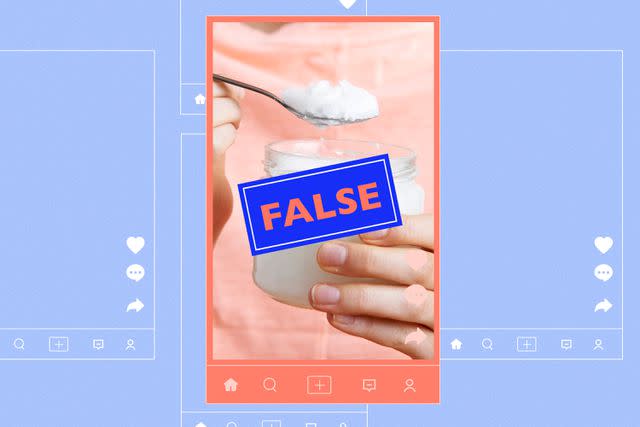TikTok True or False: Is Oil Pulling the Secret to Good Oral Health?
Ahead, two dentists analyze the oral health benefits of oil pulling.

Getty Images
TikTok True or False is the answer to your burning questions about the health, beauty, and fitness fads taking over your social feeds. Each story breaks down a buzzy wellness trend with the help of experts and scientific research to uncover the truth and safety behind the viral "advice" you see online. You'll never have to wonder what's actually legit — or what to skip — again.
Oil pulling, an ancient Ayurvedic practice that involves swishing oil around in your mouth, has exploded on TikTok, amassing over 630 million views under the hashtag #oilpulling. Though to many, the thought of swishing oil around your mouth may seem unfavorable, the practice is being praised for its list of oral health benefits, including banishing bad breath, boosting gum health, and even whitening teeth a few shades (just check out this viral video from an Ayurveda enthusiast). But, like with any viral hack, you have to pause and ask yourself if there is any validity to these claims, which, to many, are too good to be true.
Like any viral TikTok hack, distinguishing between myth and truth takes additional research outside the app. In this article, we’ve done some leg work for you, deep diving into the truth behind oil pulling, whether it genuinely improves oral health and whether the ritual is worth carving out time for in your daily routine.
What is Oil Pulling?
As briefly mentioned, oil pulling, a practice dating back 3,000 years, originates in Ayurvedic medicine. Dr. Jonathan Everett of Kirkland Family Dentistry describes oil pulling as "a technique for maintaining hygiene involving swishing oil, like coconut or sesame oil, in your mouth for around 15 to 20 minutes.” This traditional method is believed to enhance gum health and improve oral hygiene by eliminating toxins and bacteria in the mouth. As mentioned in a now-viral TikTok video, the fat in the oil is said to attract bacteria, plaque, and toxins and whisk them away when you dispose of the oil (which should never be done in the sink if you care about your septic system).
The Effectiveness of Oil Pulling
Regarding the effectiveness of oil pulling, expert opinions are very different than those of enthusiasts on TikTok. According to Dr. Everett, “[oil pulling’s] effectiveness in killing bacteria associated with bad breath, tooth decay, or gum disease is not fully supported by robust scientific evidence.” Sharing the same sentiments, Dr. Craig Barney of Kennewick Dentral adds, “While [oil pulling] may contribute to improved gum health and fresher breath, viewing it as a supplementary practice, not a substitute for regular oral hygiene, is essential.” So, while many users on the TikTok app may share amazing testimonies supporting the benefits of oil pulling, these claims aren’t entirely supported by science and should be taken with a grain of salt.
Related: The Best Toothpastes for Bad Breath of 2024, According for Dentists
Safety and Drawbacks of Oil Pulling
The good news is, though oil pulling isn’t fully supported by science, it’s generally safe to try if you’re intrigued. Outside of those who may have an allergy to specific oils or those suffering from conditions such as TMJ, which may make enduring 15-20 minutes of swishing unbearable, dentists give the green light to try. However, Dr. Everett and Dr. Barney agree that oil pulling should be a part of a comprehensive oral care routine that includes daily brushing, flossing, rinsing, and regular checkups with a professional dentist. Dr. Everett stresses, “[oil pulling] is not a substitute for regular brushing and flossing.”

Getty Images
The Verdict on Oil Pulling for Oral Health
In summary, while oil pulling may have some benefits, it should not overshadow proven dental care methods. Dr. Everett advises, “Regular brushing, flossing, and professional dental cleanings remain the foundation of good oral health.” Dr. Barney concurs, emphasizing the importance of a well-rounded approach to oral hygiene.
Oil pulling, as resurrected by TikTok, is a practice with ancient roots and some potential benefits. However, the consensus among dental professionals is clear—it is a complementary method rather than a standalone solution for oral health. Additionally, consulting with a dentist to tailor oral care to individual needs is crucial for those considering oil pulling. As we continue to navigate the sea of information on social media, it's vital to approach such trends by meeting somewhere in the middle of appreciating traditional practices and acknowledging scientific evidence.
Related: The 8 Best Electric Toothbrushes, According to Dentists and Dental Hygienists
For more Shape news, make sure to sign up for our newsletter!
Read the original article on Shape.

